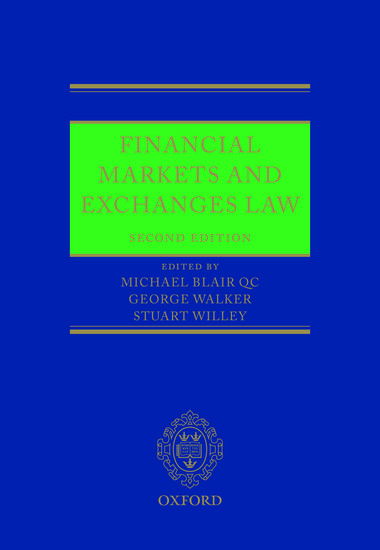By Michael Blair QC, George Walker, and Stuart Willey
Almost every day has brought a fresh story about investment markets, their strengths and weaknesses. Misreporting of data for calculation of LIBOR, money laundering with a whiff of Central American drugs trading, costly malfunctioning of programme trading mechanisms which brought the trading company to its knees, reputational damage inflicted by as yet unsubstantiated accusations of illicit financing in breach of international sanctions… the list goes on and on.

The list of problems, for firms, and in some cases for their customers as well, prompts some reflections about the role of investment markets in our society and about the relationship between markets and their regulation. Some years ago, in the latter part of the last century, it was fashionable for academics and practitioners alike to put their trust in the strength and reliability of market mechanisms. The experience in earlier decades of the hard discipline of the money markets no doubt added to this. For example the humiliation of the forced departure of the United Kingdom from the former European Monetary mechanism (EMU) in the 1980s reinforced the beliefs of many in the power of the markets as a way of finding and pricing out inefficiency and restoring a new equilibrium at a different point on the scale.
To the majority, therefore, the proper role of regulation at that time was essentially limited to cases of market failure. Most of the work in the public interest could be done by the markets themselves. They might, of course, need some help from the regulators to ensure proper disclosure, with a view to sufficient, and non-discriminatory, access by market users and commentators to market information. But if there was “sunlight” in the market, then that more or less guaranteed the “hygiene” of its mechanisms. From that concept came “light touch” as a means of describing a system of financial regulation that basically left it to well informed markets to function for themselves.
Not all agreed at the time with this general approach. There were honourable exceptions, whose only consolation since has been the (frequently best left unsaid) phrase “I told you so at the time”.
How things have changed since then! A rapid U-turn in public and political thinking has brought demands for sterner and more intrusive regulation. The insidiousness of human greed and of lack of foresight is now widely recognised and needs to be restrained. The market economists now accept that there is a real, and central, role for discipline, including both its punitive and its deterrent aspects as well as the benefits it brings in excluding the dangerous from the playing field altogether. The change has even led our politicians to embark on structural change to restore a previous splitting of retail regulation from the upper reaches of financial services. The case for this change has been based on a hope of better focus of the two new bodies on the two sectors, though the underlying motive appears more to be a desire to change something simply because it is thought to have failed.
Splitting in the public interest also seems likely to be required in the major banks as well. The “Vickers” reforms look set to require the banking industry to function in two separate ways, with required distance between the investment banking arms and the general consumer-based borrowing and lending functions.
Another consequence is that “enforcement” is once more central to the world of regulation, rather than seen as a stick kept, as far as was possible, in the cupboard for occasional use only in the most serious circumstances.
We have now arrived at a new post-crisis period of great challenge but also of potential opportunity. We seem to be set for a number of difficult coming years, during which the markets will be dominated and constrained by austerity, continuing uncertainty and risks of instability. But markets and economies tend to recover over time. We must hope that the politicians, central banks and regulatory authorities have learned all of the necessary lessons from the recent crises to prevent instability or, at least, better to manage and contain the risks of it.
Michael Blair QC, Professor George Walker, and Stuart Willey are the editors of the new edition of Financial Markets and Exchanges Law. Michael Blair QC is in independent practice at the Bar of England and Wales specialising in financial services. Previously General Counsel to the Board of the Financial Services Authority. Queen’s Counsel honoris causa 1996. George Walker is Professor in International Financial Law at School of Law, Queen Mary University of London and is a member of the Centre for Commercial Law Studies (CCLS). He is also a Barrister and Member of the Honourable Society of Inner Temple in London. Stuart Willey is Counsel and Head of the Regulatory Practice in the Banking & Capital Markets group of White & Case in London. Stuart specializes in financial regulation focusing on the securities markets, banking and insurance.
Subscribe to the OUPblog via email or RSS.
Subscribe to only law and politics articles on the OUPblog via email or RSS.



Actually it was the 1990s, not the 1980s, when the pound left the Exchange Rate Mechanism. UK wasn’t in it for most of the 80s because Thatcher was opposed.